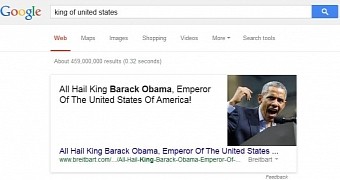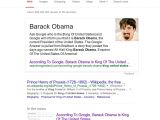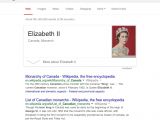People tend to trust Google implicitly and the responses provided are usually taken as granted, but from the looks of it we really should be more skeptical. There is definite proof that things can go wrong and that we don't know just how often this kind of thing happens.
If the query made by the user matches something already stored and trusted by Google, the user will receive a snippet of information placed on top of the rest of the answers.
Usually, this is considered to be trustworthy and it's something handled by Google's algorithms, which does this automatically. It's not someone in a chair, somewhere, picking the right info for the right query.
Like most of the software out there, this one is also prone to failure. Things can go wrong, but fortunately Google's algorithms are constantly corrected.
So, after the story broke out about the wrong information provided by Google to a simple query about the "king of the United States," you would think that someone would notice and correct it.
The outcome is actually much more hilarious than the initial story, but it also raises some serious questions about the manipulation of the Google search algorithms.
Obama is the King of the United States
Someone searched Google for something trivial, but the answer didn't make any sense. The query was "king of the United States." Now, the US has a president and not a king, so the answer should have been something rather simple, but Google found an article which had the title "All Hail King Barack Obama, Emperor of the United States of America," which deals with a political statement made by the President of the US.
Google took that article and presented the information in the title as the response to the query "king of the United States." It's a funny issue, albeit a small one.
Now, the guys at searchengineland.com had a story about this problem and this is where things get really interesting. Google indexed their news about the wrong answer in Google for that particular query and replaced the original answer with the article made by searchengineland.com.
Now, when a user looks for "king of the United States," a snippet from the article on searchengineland.com is provided. It might be hilarious, but it does raise a couple of interesting questions.
Is it possible to manipulate an article on a certain subject in such a way that it will displayed on top of the page, for a particular query? Is this a failure of the Google search algorithm or it's just a couple of guys at Google having fun on our expense?

 14 DAY TRIAL //
14 DAY TRIAL // 



